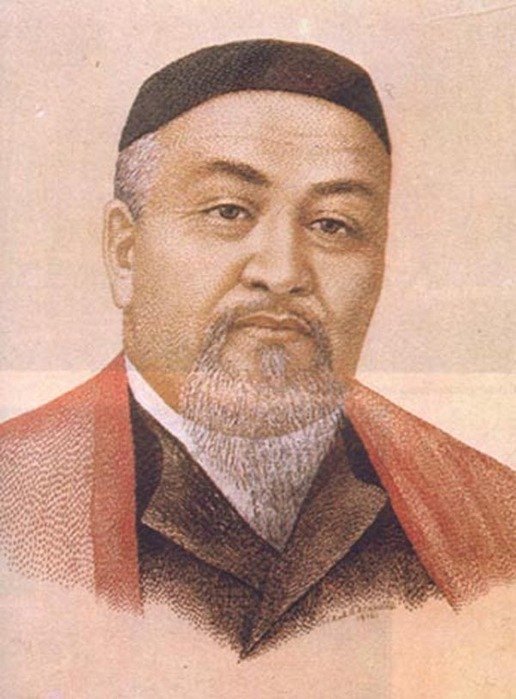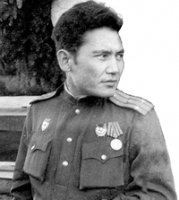 Few people know that Baurzhan Momyshuly was the idol of Ernesto Che Guevara and Fidel Castro, ‘Volokolamsk Highway’ was one of the favorite books of Comandante Che and Castro…
Few people know that Baurzhan Momyshuly was the idol of Ernesto Che Guevara and Fidel Castro, ‘Volokolamsk Highway’ was one of the favorite books of Comandante Che and Castro…
We would like to introduce you the article of Serik Malyeev, a famous journalist, observer of Liter newspaper, about the son of Kazakh people, Hero of the Soviet Union, a writer, Baurzhan Momyshuly.
***
Великую Отечественную войну в разных странах СНГ освещают по-разному. На то существуют объективные причины. Но есть главные исторические события в этой войне, которые трактовать иначе невозможно. Так, если бы в сентябре – октябре 1941 года, когда основные воинские формирования Красной Армии оказались во вражеском окружении под Вязьмой, на защиту Москвы не встали дивизии, сформированные в Казахстане и Сибири, сам ход истории мог бы повернуться по-другому.
О народе-воине
Бывшие немецкие солдаты, которым пришлось непосредственно сражаться против воинов Панфиловской дивизии, сформированной в Алматы, пишут в своих мемуарах, что «монголы воевали грамотно и отчаянно, не уступая ни пяди русской земли».
Так они представляли себе в годы войны казахов. И здесь следует рассказать особо о Бауржане Момышулы, герое-панфиловце, пять раз выводившем свой батальон из вражеского окружения. Бауржан Момышулы разработал собственную тактику и стратегию ведения боевых действий в глубоком тылу врага, получившую название «Спираль Момышулы», изучаемую сегодня в академиях генеральных штабов многих государств. Он не боялся попасть во вражеское кольцо, а если надо, то и сознательно шел со своими бойцами вглубь территории врага. И это в то время, когда не только полковники, но и генералы Красной Армии панически страшились окружения, моментально теряя управление войсками, стоило только возникнуть подобной угрозе.
Другой фрагмент боевой биографии героя. В своем письме с фронта от 18 апреля 1943 года председателю Совета народных комиссаров Казахской ССР Ондасынову Бауржан Момышулы пишет: «Являясь участником, руководителем и наблюдателем более 100 боев, я пережил горечи неудач и радости побед, радости подвига своего лично и солдат наших.
Еще в феврале 1942 года я попытался обобщить результаты личных переживаний, наблюдений за другими, действий отдельного солдата, оружия, по видам боев и другим психологическим особенностям в общую тему: «Мысли о воспитании боевых качеств». Мне удалось немного изложить свои соображения на бумаге, но за неимением времени до сих пор не представляется возможным закончить начатое, и эти мысли неотступно преследуют меня, как только освобожусь на несколько минут от непосредственной работы. Я убедился на своем опыте, что для воспитания боевых качеств бойца имеет колоссальное значение военное прошлое солдата и национальные традиции.
Одну из ненаписанных глав своей рукописи в плане я назвал «Благородные традиции казахского народа, воспитывающие боевые качества в джигите», в этом личном письме к Вам, как со старшим братом, хочу поделиться с Вами набросками этой главы». И далее Бауржан Момышулы рассказывает, как боевые традиции казахов помогают солдатам Панфиловской дивизии противостоять врагу. В своем письме он настаивает, чтобы руководство республики не забывало обычаи своего народа, на основе которых в казахской среде во все века воспитывались воины. Приводя следующую казахскую пословицу: «Честь дороже жизни».
Сам батыр всегда придерживался этого принципа. О мужественном характере офицера свидетельствует следующий случай. Уже после того, как состоялся парад Победы, в Колонном зале Дома Советов чествовали героев войны – офицеров, наиболее отличившихся в ратном деле. Сталина сопровождал Георгий Константинович Жуков, лично представлявший подчиненных. И вот, когда дошла очередь до Момышулы, Сталин, обращаясь к нему, сказал: «Поздравляю вас, товарищ Бауржан Момышев с великой Победой». На что прославленный батыр ответил, не испугавшись поправить диктатора: «Служу Советскому Союзу. Гвардии полковник Бауржан Момышулы».
Говорят, Сталин на эту реплику только криво ухмыльнулся и пошел дальше. И это не единственный случай, когда Бауржан Момышулы проявлял упрямство своего характера. Он не хотел менять свою фамилию в угоду существовавшим тогда установкам, категорически возражая против окончания «ев». О чем еще в годы войны особо бдительные товарищи неоднократно докладывали Сталину.
Как ковался характер бойца
Отец Бауржана Момыш был образованным человеком, знал арабскую письменность, читал Коран. В друзьях у Момыша была русская семья Гончаровых. С ее главой отец Бауржана были тамырами. Была в те годы такая хорошая традиция. У Гончаровых было тринадцать своих детей. И Момыш отдает Бауржана на воспитание Гончаровым. Таким образом, Бауржан становится четырнадцатым ребенком в этой большой семье. Он ходит в русскую школу. Заканчивает ее с хорошими оценками.
А в это же время в степи происходят страшные события. В тридцать третьем году в результате искусственного голодомора погибает большая часть казахского народа. А спустя еще четыре года начинается тотальное истребление казахской интеллигенции. В те годы в казахской среде получает широкое распространение письмо крупного казахского писателя Жусупбека Аймаутова, в котором открыто заявляется, что большевики хотят уничтожить казахскую элиту, чтобы обезглавить нацию, и без того крайне ослабевшую после голодных двадцатых-тридцатых годов.
Понятно, что все эти события не могли не наложить свой отпечаток на взгляды молодого Момышулы, дав позже его неприятелям основание для обвинения Бауржана в национализме. Только потому, что он любил и защищал свой народ. Уже в годы войны комиссар Логвиненко и смершевец Белков написали на командира своего полка Бауржана Момышулы донос, в котором есть такая примечательная фраза: «Бауржан Момышулы – великолепный командир, отважный, находчивый…но он никогда не поднимает тост за товарища Сталина».
И понятно, почему. Бауржан Момышулы был живым свидетелем трагедии казахского народа 1933–1937 годов. Обладая великолепным аналитическим умом, он не мог не понимать, что гибель трех миллионов человек в мирное время не является случайной.
Поступок
Хранила ли судьба Бауржана Момышулы? Сложный вопрос. Но в тот раз донос своей цели не достиг. А был еще случай. В 1937 году, когда в армии шли повальные чистки и многие командиры оказались в лагерях или были расстреляны, группа товарищей направила рапорт вышестоящему командованию, обвинив Момышулы в яром национализме. И кто знает, как бы повернулись дальнейшие события, если бы вскоре эти самые товарищи сами не попали под трибунал. Как говорят в таких случаях: «Не рой другому яму». Донос и в этот раз не сработал. Правда, обвинение в национализме с Бауржана Момышулы не сняли. Так оно и будет преследовать его по жизни, отравляя ее и давая его врагам лишний повод для травли батыра.
Да, Момышулы был не слишком удобным героем – излишне принципиальный, прямолинейный, любящий свой народ всем сердцем. И уже одно это доставляло ему много хлопот и неприятностей. Рассказывают, что как-то горисполком решил выделить Бауржану Момышулы пятикомнатную квартиру, поскольку до этого он с семьей ютился в маленькой двухкомнатной развалюхе. И вот когда он, уже получив ключи от нового дома, решил было справить новоселье, на пути ему встретилась плачущая женщина. Бауржан спросил ее, отчего та плачет. И женщина ответила: «Я – мать погибшего солдата. Должна была по очереди получить жилье. А теперь мою квартиру отдают какому-то большому начальнику в обход общей очереди». И тогда, говорят, Бауржан, со словами: «Мне не нужна квартира, омытая слезами матери погибшего солдата», – на глазах собравшихся разорвал свой ордер.
Очищение
Во время правления Сталина звание Героя Советского Союза Бауржану так и не присвоили. К концу войны он командовал дивизией, но и генеральского звания ему не дали. А переходить с командования дивизии на командование полком он и сам не захотел. И тогда Бауржан Момышулы подает в отставку. Он уезжает к себе домой, в Казахстан.
Но и на этом его мытарства не заканчиваются. Подвиг Бауржана Момышулы на родине замалчивается, его славе завидуют, всенародная любовь к своему герою вызывает у многих чинуш скрытую неприязнь. Словом, неприятности продолжаются. И в этом уже заслуга местных партийных функционеров, знавших прекрасно, чем дышит наверху ЦК и Кремль, и поэтому в борьбе с «казахским буржуазным национализмом» старавшихся быть «святее Папы».
Рассказывает заслуженный деятель Республики Казахстан, режиссер-кинодокументалист Калилла Омаров: «Вообще, у нас в обществе в последние годы сложился стереотип, что все зло от России. Но почему-то никто не говорит, что и здесь на местах местные чиновники были далеко не ангелы. Я готовлю документальный фильм о Бауржане Момышулы ко дню его столетия. И вот мне посчастливилось наткнуться на письмо Бауржана Момышулы своему двоюродному брату Абдильде, в котором он излагает суть своего разговора, состоявшегося с бывшим председателем Совета министров Нуртасом Ондасыновым, пришедшим домой к Бауржану, чтобы принести ему лично свои извинения. Об этом сегодня мало кто знает, но когда из центра пришло представление на присвоение Бауржана Момышулы к званию Героя Советского Союза и во второй раз, когда его хотели удостоить звания генерал-майора, оба раза Нуртас Ондасынов, бывший в то время председателем Совета министров подписывал отказную, находя для этого удобный предлог.
И вот в конце своей жизни Ондасынов приходит к герою и просит у него прощения: «Мы выступали против тебя, – говорит он Бауржану, – но ты все равно нас победил. Сегодня тебя знает весь мир. А о нас даже никто и не вспомнит». Об этой встрече мне рассказал живой свидетель той беседы, руководитель научно-исследовательского центра «Бауржановедения», профессор, доктор филологических наук Мекемтас Мырзахметов. И об этом же разговоре свидетельствует народный писатель Азильхан Нуршаихов. У старика Ондасынова хватило мужества признать свою вину перед героем. Наверное, это и называется катарсисом – очищением души перед уходом в мир иной».
Секрет героя
А мне остается только изложить ответ Бауржана Момышулы Нуртасу Ондасынову, изложенный им в стихах:
Не такая большая беда –
То, что мне не досталась Звезда.
Свою тайну открою тебе, мой народ,
Я умру за тебя, если долг позовет!
Ну а если я клятву не исполню свою,
Даже если проклянешь, я проклятье приму.
(Перевод с казахского автора)
Добавлю к сказанному. В 1990 году, по представлению первого секретаря ЦК КПК Казахстана Нурсултана Назарбаева, Бауржану Момышулы было присвоено посмертно звание Героя Советского Союза. А еще через год Советский Союз распался. Так Бауржан Момышулы оказался последним героем той страны, с которой его связывали столь непростые отношения.
***

 Only half of a year passed as foster children of our affiliated boarding schools, who study in graduation classes, have started their eight month training courses to prepare to the common national testing in one educational center of Almaty city. Saby Charitable Foundation will bear all expenses with the purpose of children education.
Only half of a year passed as foster children of our affiliated boarding schools, who study in graduation classes, have started their eight month training courses to prepare to the common national testing in one educational center of Almaty city. Saby Charitable Foundation will bear all expenses with the purpose of children education. 











Recent Comments